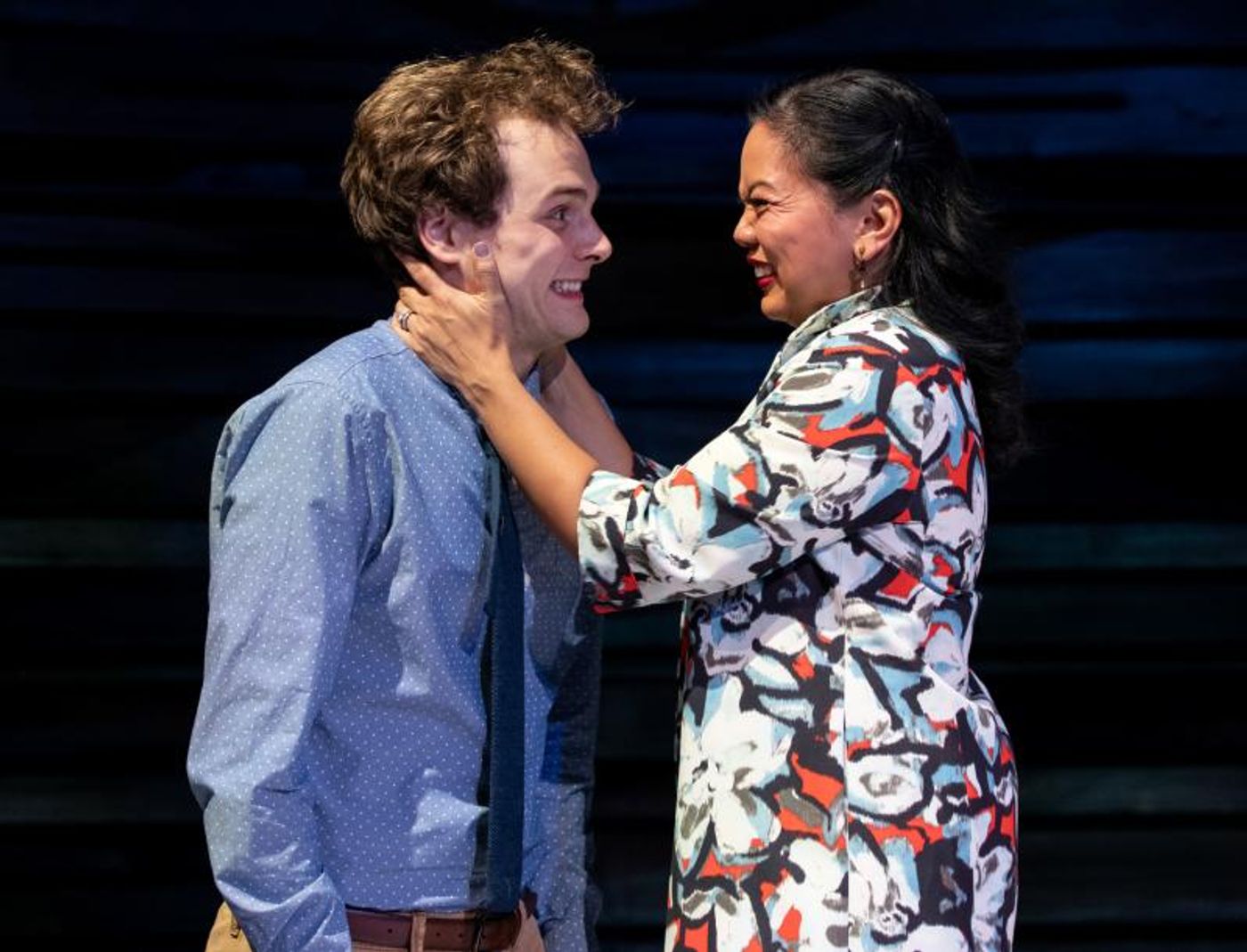Review: RIGHT TO BE FORGOTTEN at Arena Stage

It's often said that the internet is forever. A massive, universal depository of information, the internet has quickly become a vital record of human knowledge and interactions. It's also, unsurprisingly, interwoven into every aspect of our lives - we consult the internet not only for educational and communication purposes, but also to determine where to eat, who to date, where to shop, who to hire, and what shows to go see. We also rely on it to keep a record of our lives - our photos, friendships, schedules, and habits are all filed on the world wide web. Permanently.
But what if those records are inaccurate? Or correct, but presented out of context? What if someone added to our record against our knowledge or permission? What if the internet preserves a version of us that no longer exists?
In the early days of the internet, we happily put every aspect of our lives on display; it's only in recent years that we've started to grapple with what, exactly that means. Improved technology and greater understanding of the applications and impact of that technology has raised serious questions about the information we put online, its accessibility to others, and its longevity. Internet privacy has become an issue of serious consequence - for governments, for the law, for tech companies, and for individuals.
Enter Sharyn Rothstein's new play, Right to be Forgotten, which premiered at Arena Stage this month. Drawing its title from the EU's internet privacy rulings that required search engines create a "right to be forgotten" procedure for removing records, the play follows Derril Lark (John Austin), a PhD student with a shameful past preserved on the internet despite his best efforts to move on. When his personal and professional lives both continue to suffer a decade after the incident, he enlists internet privacy attorney Marta Lee (Melody Butiu) to help wipe away his online presence. Fresh off a string of losses, Marta is initially skeptical of Derril, but is convinced of both his sincerity and the merit of his case. They utilize the internet to increase awareness and attention, which in turn gains them the support of the public and the Attorney General. But the tech companies aren't willing to cede control, and the principles Derril and Marta are fighting for aren't as straightforward as they initially seem.
Rothstein's witty and insightful text is brought to life by a stellar cast, courtesy of Victor Vazquez. Austin's Derril is awkward and introverted, unsure of how to interact with people after years of social isolation, loss, and immersion in his studies. And yet, he lights up whenever he recites poetry, giving us a window into the man Derril could be under different circumstances. Austin shows us that Derril's insecurity shouldn't be mistaken for weakness; despite his meekness and his self-policing, Derril is adamant about his self-worth and right to his own narrative. Austin also brings subtle comedy to Derril's mostly straightforward and sincere delivery, ensuring he is endeared to the audience.

As Marta, Butiu dominates the show with her humor, bombast, and passion. Her quick rejoiners and faith in Derril and the cause immediately endear her to the audience - so much so that it's hard not to admire her even as she makes multiple questionable decisions. In fact, Marta's appeal is so great that concern doesn't even register until long after the fact; Butiu imbibes the character with such charisma and passion, that the audience's adoration is inevitable. Marta is smart, resourceful, and ideological, and willing to take on the herculean task of challenging Big Tech - all with a smile, a witty remark, and an incredible facial expression.
Derril and Marta's biggest challenge comes in the form of Annie (Rachel Felstein), Marta's former colleague and friend who has earned a reputation as Big Tech's secret weapon. Oozing confidence, Felstein's Annie struts around the stage in the perfect image of a sleazy lobbyist, but slowly shows the audience a more nuanced, thoughtful woman. Annie is a confident woman who's good at her job, but the vulnerability that she reveals makes it clear she's also principled - even if those principles are at odds with Marta's.
As the Attorney General who agrees to take on Derril's case, Edward O'Blenis is nuanced in his portrayal of the conflicted politician. His struggles to weigh a worthy cause against his reelection concerns may not be new, but O'Blenis manages to humanize the character. He's at his best, though, when he's working with the socially awkward Derril, barely suppressing his eyerolls, and when he's sparring with Marta - after all, Santos takes a no-nonsense approach to his work. Which is a shame, because Marta loves her nonsense.
Rounding out the cast are Shubhangi Kuchibhotla as Derril's love interest, Sarita, and Guadalupe Campos as Eve, the woman connected to Derril's past indiscretion. Kuchibhotla's Sarita is funny, quirky, and guarded; she and Austin show their characters' easy chemistry, but she also expertly walks the audience through Sarita's internal struggle over whether to trust her instincts and attraction to Derril, or the warnings of sense, experience, and her friends to stay away. Campos, in turn, shows us the aftermath of Derril's actions; while the audience is sympathetic to his situation, it's impossible to watch this woman whose sense of security has been shattered and not feel something for her and those like her. Eve is a woman who has spent the last decade constantly looking over her shoulder, worried for her safety and the safety of her students. Campos gives us the other side of Derril's circumstances, and makes the audience sincerely question their sympathies.

With a cast this strong, it's important to have an equally strong production team, and, thankfully, Arena delivers. Seema Sueko's direction is direct and empathetic, and she carefully manages each turn of the story so the audience can enjoy watching it unfold. Under her guidance, the cast makes great use of the space, and it's easy to immerse yourself in their world. Paige Hathaway's set is minimalistic and versatile, providing the perfect background for Shawn Duan's incredible projections; the use of binary projections on the set and cyrons to move the plot was thematically fitting and visually impressive. Ivania Stack's costumes gave great direct insight into each character at a glance; I personally would love to steal some of Marta's coats.
Right to be Forgotten is a thought-provoking, insightful play that addresses a key issue in our lives. Arena Stage's production is a smart, solid, and charming show with a strong cast and production team, and has the ability to elevate the debate in an honest and nuanced way.
Arena Stage's Right to be Forgotten is playing through November 10th. Run time is approximately 90 minutes with no intermission. More information about tickets, accessibility (closed captioning is available for all performances), and related discussions can be found on the Arena website.
Photos courtesy of Margot Schulman.
Reader Reviews
Videos

